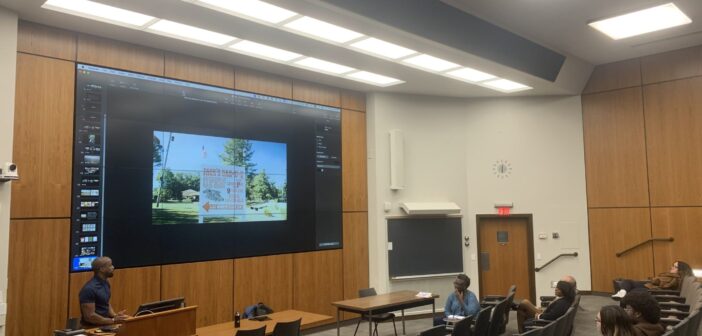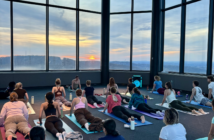Brian Foster, the Africana Studies program’s fall Visiting Faculty Fellow, spent two weeks at Lehigh discussing his sociological research about the experiences of Black communities in the rural South.
He presented his work through a screening of two short films he made and a discussion of one of the books he wrote, and contributed to a theater performance talkback and art exhibit walkthrough.
He also spent time in classrooms across campus, sharing his research and publications.
His first public event was a post-performance audience talkback with the cast and director of “Trouble in Mind” on Oct. 11 in the Diamond Theatre in the Zoellner Arts Center.
The show, set in the 1950s, depicts rehearsals of a fictional play and tells the story of Wiletta Mayer, a Black actress who struggles against the racial stereotypes of her role and the disrespect of her director and fellow actors.
Foster said the play could be summed up through one of Mayer’s lines, “You have to swallow what you mind.” He said it illustrated the struggle between her chasing her dreams and facing the realities of racial and gender discrimination.
Foster, director Kashi Johnson and the nine members of the cast agreed the message of the show is still relevant to modern audiences even though it was written in 1955.
Many of the cast members also said they were able to connect what they learned about racial injustice in that time period with their own experiences and observations. They said this gave them stronger personal connections with the show’s characters and story.
Victoria Wagner, ‘24 ‘26G, said she heard about the show from friends who had enjoyed it, and was able to connect with the story’s depiction of racism and sexism, since she has faced both of those things as a minority and a woman in STEM.
“It was nice seeing it actually being shown to audiences and being perceived in a way that everyone could understand, I thought was very impactful,” Wagner said.
Later that week, Foster screened “We Travel” and “We Dance,” two short films he co-directed that depict his sociological work. The screening was held in the Sinclair Lab Auditorium on Oct. 11.
The first film, “We Travel,” traces the story of four generations of men in Foster’s family. He used the family’s practice of hog butchering to draw parallels to the racial violence the family witnessed in eastern Mississippi.
The second, “We Dance,” tells the story of a husband and wife dancing duo, both separately and as a couple.
It also shows their connection with Southern food and their relationships with their mothers.
Foster said he first decided to make films when he dug into his family history and realized he wanted to tell the story visually, not just in a book. He has since made two other films, one of which has not yet been released, furthering this goal of pairing visuals with oral histories.
Trinity Price, ‘25, said Foster spoke in one of her classes, Sociology of Black Families, and his brief discussion of the films he made sparked her interest, as she is interested in storytelling and film.
She said this class allows students to attend certain educational events as a substitute for assignments, and after seeing Foster’s event listed as an option, she knew she wanted to go.
“I do value stories, especially those that portray the Black experience, which tell stories that sometimes aren’t told on a larger scale,” Price said.
Price said she especially connected with the stories Foster’s work told because she has family from the areas depicted in them and learned about her family history through visits to her great-grandmother in Mississippi and her grandparents in Chicago.
The event series continued Oct. 15 as Foster and Stacie Brennan, the LUAG curator, gave a walkthrough of “Really Free,” an exhibit of Nellie Mae Rowe’s artwork.
Rowe, a civil rights activist and folk artist, began her art career later in life and is recognized for her unique style and creative use of recycled materials.
Foster explained how Rowe’s work was influenced by growing up in the rural South and how she made sense of her life experiences through art.
He connected Rowe’s story with one of his books, “I Don’t Like the Blues: Race, Place and the Backbeat of Black Life” and discussed the exhibit in the context of his research on Black rural communities.
Dorothy Tang, ‘27, said she came to the event because of a class but found Foster’s explanations of Rowe’s work interesting.
“It was my first time checking out the art gallery, and it was nice to have someone to walk me through the exhibit from a different perspective,” Tang said.
The final event of the series was Oct. 17 in the Business Innovation Building as Foster presented his most recent book, “Ghosts of Segregation: American Racism, Hiden in Plain Sight.” This work is a collection of essays about Foster’s life and reflections on how people and circumstances have shaped it.
There are over 100 photos in the book, which Foster said give context to his life in a region still riddled with systemic racism.
At the event he shared excerpts from the book and explained the lessons and ideologies he drew on to write it.
Janiahya Rozier, ‘28, said her first year seminar professor encouraged her to attend the lecture, but when she learned more about the event’s content she found a personal connection.
“As I looked on the (LUAG) website to see the details, I felt drawn to it,” Rozier said. “As a Black person, hearing stories about people’s trials and the things they went through inspires me. It makes me more proud of myself and more proud of who I am.
Foster said he hopes his work will inspire people, especially students, to become intentional about what they do and how they live.
John Vilanova, one of the Africana Studies faculty who organized Foster’s visit, said he learned from the sociologist and hopes to use some of the concepts shared in the events of the past two weeks in his own work.
Vilanova also said Foster’s time at Lehigh was a success because different groups at the university were able to work together and coordinate the events.
“This visit was successful because of the incredible collaborators that we have across campus,” Vilanova said. “It wasn’t just engaging with different academic departments. We engaged with all of these different campus constituencies.”






Comment policy
Comments posted to The Brown and White website are reviewed by a moderator before being approved. Incendiary speech or harassing language, including comments targeted at individuals, may be deemed unacceptable and not published. Spam and other soliciting will also be declined.
The Brown and White also reserves the right to not publish entirely anonymous comments.